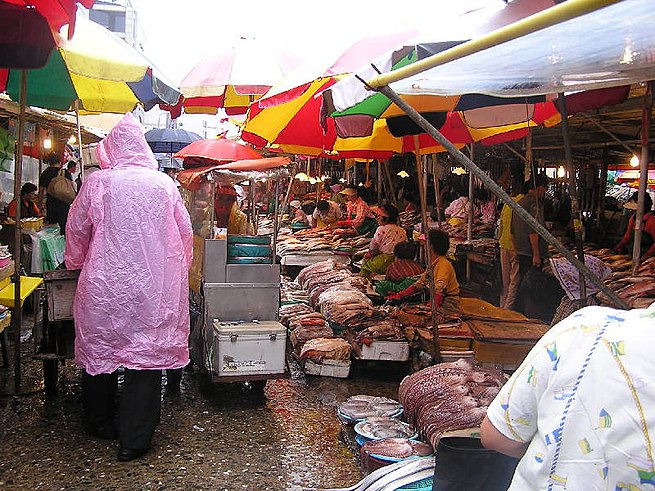
-
Supermarket
A supermarket is a self-service shop offering a wide variety of food and household products, organized into sections and shelves. It is larger and has a wider selection than earlier grocery stores, but is smaller and more limited in the range of merchandise than a hypermarket or big-box market.
The supermarket typically has aisles for meat, fresh produce, dairy, and baked goods.
Shelf space is also reserved for canned and packaged goods and for various non-food items such as kitchenware, household cleaners, pharmacy products and pet supplies. Some supermarkets also sell other household products that are consumed regularly, such as alcohol (where permitted), medicine, and clothes, and some sell a much wider range of non-food products: DVDs, sporting equipment, board games, and seasonal items (e.g., Christmas wrapping paper in December).
A larger full-service supermarket combined with a department store is sometimes known as a hypermarket. Other services may include those of banks, cafés, childcare centres/creches, insurance (and other financial services), Mobile Phone services, photo processing, video rentals, pharmacies or petrol stations. If the eatery in a supermarket is substantial enough, the facility may be called a “grocerant”, a blend of “grocery” and “restaurant”.The traditional supermarket occupies a large amount of floor space, usually on a single level. It is usually situated near a residential area in order to be convenient to consumers. The basic appeal is the availability of a broad selection of goods under a single roof, at relatively low prices. Other advantages include ease of parking and frequently the convenience of shopping hours that extend into the evening or even 24 hours of the day. Supermarkets usually allocate large budgets to advertising, typically through newspapers. They also present elaborate in-shop displays of products.
Supermarkets typically are chain stores, supplied by the distribution centers of their parent companies thus increasing opportunities for economies of scale. Supermarkets usually offer products at relatively low prices by using their buying power to buy goods from manufacturers at lower prices than smaller stores can. They also minimise financing costs by paying for goods at least 30 days after receipt and some extract credit terms of 90 days or more from vendors. Certain products (typically staple foods such as bread, milk and sugar) are very occasionally sold as loss leaders so as to attract shoppers to their store. Supermarkets make up for their low margins by a high volume of sales, and with of higher-margin items bought by the attracted shoppers. Self-service with shopping carts (trolleys) or baskets reduces labor cost, and many supermarket chains are attempting further reduction by shifting to self-service check-out.
-
Supermarket (noun)
A large self-service store that sells groceries and, usually, medications, household goods{{,}} and/or clothing.
“I went to the supermarket to buy some food.”
-
Supermarket (noun)
A chain of such stores.
-
Supermarket (noun)
A one-stop shop; a place offering a range of products or services.
-
Market (noun)
City square or other fairly spacious site where traders set up stalls and buyers browse the merchandise.
-
Market (noun)
An organised, often periodic, trading event at such site.
“The privilege to hold a weekly market was invaluable for any feudal era burgh.”
-
Market (noun)
Flea market
-
Market (noun)
A group of potential customers for one’s product.
“We believe that the market for the new widget is the older homeowner.”
-
Market (noun)
A geographical area where a certain commercial demand exists.
“Foreign markets were lost as our currency rose versus their valuta.”
-
Market (noun)
A formally organized, sometimes monopolistic, system of trading in specified goods or effects.
“The stock market ceased to be monopolized by the paper-shuffling national stock exchanges with the advent of Internet markets.”
-
Market (noun)
The sum total traded in a process of individuals trading for certain commodities.
-
Market (noun)
The price for which a thing is sold in a market; hence, value; worth.
-
Market (verb)
To make (products or services) available for sale and promote them.
“We plan to market an ecology model by next quarter.”
-
Market (verb)
To sell
“”We marketed more this quarter already then all last year!”
-
Market (verb)
To deal in a market; to buy or sell; to make bargains for provisions or goods.
-
Supermarket (noun)
a large self-service shop selling foods and household goods.
